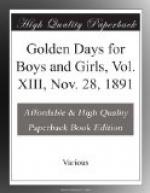But Phil really enjoyed it, and sat on the capstan, watching two grizzled old sailors heave the lead with unmoved interest.
“By the deep nine,” sang out the elder of the two seamen, as he reeled in his line and took a weather-wise look over his shoulder.
“Just so,” said Mr. Moore, the short, red-whiskered mate of the Osprey, who stood by the skylight, with his lantern under his arm, carefully directing the business of taking soundings. “We ought to make Largo Light in an hour, if she keeps on at this rate.”
“Aye, aye, sir! But it’s a rough night for knowing just where we are, or the rate of speed she’s making,” responded the sailor, as he went forward, followed by his companion, both drenched to the skin, and their gray beards and brown faces wet with the pelting rain.
The cargo of the Osprey was of a decidedly mixed character, consisting mainly of cotton bales, coffee, “canned goods,” small merchandise, and, among the rest, a lot of cattle, a dozen or more horses and two mules, which set up such a braying, bellowing and neighing, as the storm increased in violence, and the ship began to roll heavily in the trough of the sea, that the din raised was appalling, added to the wild shrieking of the wind through the cordage and the rush and roar of the towering waves.
Besides Mr. Herdic and the two boys, there was only one other passenger on board the Osprey—a small, middle aged man, evidently of Spanish descent, dark, clean-shaven, nervous, and not remarkable for either sociability or good manners.
His name was Paul Casimer, his destination Havana, by the way of Key West, and his wealth—if rumor was to be relied upon—considerable.
Officers, passengers and crew, all told, were just nineteen souls, counting the colored cook and cabin boy, the former of whom was especially liked by Phil, for he was a good-natured fellow, with the thickest lips, the kinkiest wool, and the biggest white, rolling eyes that Phil had yet come across in all his Florida wanderings.
The mate still stood by the skylight, with the lantern in his hand, when Paul Casimer made his appearance on deck, wearing a long sea-coat that reached to his heels, and with a slouch hat drawn low over his eyes and violently pulled down at the back, to keep out the weather.
“A rough night, Mr. Moore,” he said, rather crabbedly. “What are our soundings?”
“Nine fathoms,” answered the mate, with no very evident desire to be communicative.
“And little enough it is, too!” grumbled Mr. Casimer. “We will be on the reefs the first you know, if you keep her going at this rate—twelve or fourteen knots an hour, and the wind tight after us.”
Mr. Moore made no reply, and when he had made two or three turns of the deck, with every appearance of having very little confidence in either his legs or his stomach, Mr. Casimer sullenly retired, and Phil and the mate were again alone.




